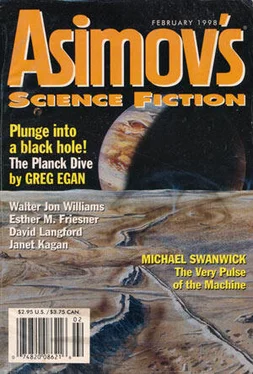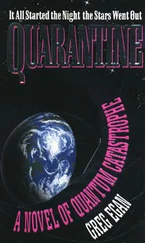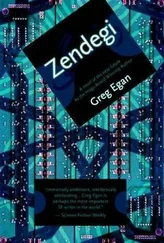The Planck Dive
by Greg Egan

Illustrations by Darryl Elliott
Gisela was contemplating the advantages of being crushed—almost certainly to death, albeit as slowly as possible—when the messenger appeared in her homescape. She noted its presence but instructed it to wait, a sleek golden courier with winged sandals stretching out a hand impatiently, frozen in mid-stride twenty delta away.
The scape was currently an expanse of yellow dunes beneath a pale blue sky, neither too stark nor too distracting. Gisela, reclining on the cool sand, was intent on a giant, scruffy triangle hovering at an incline over the dunes, each edge resembling a loose bundle of straw. The triangle was a collection of Feynman diagrams, showing just a few of the many ways a particle could move between three events in spacetime. A quantum particle could not be pinned down to any one path, but it could be treated as a sum of localized components, each following a different trajectory and taking part in a different set of interactions along the way.
In “empty” spacetime, interactions with virtual particles caused each component’s phase to rotate constantly, like the hand of a clock. But the time measured by any kind of clock traveling between two events in flat spacetime was greatest when the route taken was a straight line—any detours caused time dilation, shortening the trip—and so a plot of phase shift versus detour size also reached its peak for a straight line. Since this peak was smooth and flat, a group of nearly straight paths clustered around it all had similar phase shifts, and these paths allowed many more components to arrive in phase with each other, reinforcing each other, than any equivalent group on the slopes. Three straight lines, glowing red through the center of each “bundle of straw,” illustrated the result: the classical paths, the paths of highest probability, were straight lines.
In the presence of matter, all the same processes became slightly skewed. Gisela added a couple of nanograms of lead to the model—a few trillion atoms, their world lines running vertically through the center of the triangle, sprouting their own thicket of virtual particles. Atoms were neutral in charge and color, but their individual electrons and quarks still scattered virtual photons and gluons. Every kind of matter interfered with some part of the virtual swarm, and the initial disturbance spread out through spacetime by scattering virtual particles itself, rapidly obliterating any difference between the effect of a ton of rock or a ton of neutrinos, growing weaker with distance according to a roughly inverse square law. With the rain of virtual particles—and the phase shifts they created—varying from place to place, the paths of highest probability ceased obeying the geometry of flat spacetime. The luminous red triangle of most-probable trajectories was now visibly curved.
The key idea dated back to Sakharov: gravity was nothing but the residue of the imperfect cancellation of other forces; squeeze the quantum vacuum hard enough and Einstein’s equations fell out. But since Einstein, every theory of gravity was also a theory of time. Relativity de-
manded that a free-falling particle’s rotating phase agree with every other clock that traveled the same path, and once gravitational time dilation was linked to changes in virtual particle density, every measure of time—from the half-life of a radioisotope’s decay (stimulated by vacuum fluctuations) to the vibrational modes of a sliver of quartz (ultimately due to the same phase effects as those giving rise to classical paths)—could be reinterpreted as a count of interactions with virtual particles.
It was this line of reasoning that had led Kumar—a century after Sakharov, building on work by Penrose, Smolin, and Rovelli—to devise a model of spacetime as a quantum sum of every possible network of particle world lines, with classical “time” arising from the number of intersections along a given strand of the net. This model had been an unqualified success, surviving theoretical scrutiny and experimental tests for centuries. But it had never been validated at the smallest length scales, accessible only at absurdly high energies, and it made no attempt to explain the basic structure of the nets, or the rules that governed them. Gisela wanted to know where those details came from. She wanted to understand the universe at its deepest level, to touch the beauty and simplicity that lay beneath it all.
That was why she was taking the Planck Dive.
The messenger caught her eye again. It was radiating tags indicating that it represented Cartan’s mayor: non-sentient software that dealt with the maintenance of good relations with other polises, observing formal niceties and smoothing away minor points of conflict in those cases where no real citizen-to-citizen connections existed. Since Cartan had been in orbit around Chandrasekhar, ninety-seven light years from Earth, for almost three centuries—and was currently even further from all the other spacefaring polises—Gisela was at a loss to imagine what urgent diplomatic tasks the mayor could be engaged in, let alone why it would want to consult her.
She sent the messenger an activation tag. Deferring to the scape’s aesthetic of continuity, it sprinted across the dunes, coming to a halt in front of her in a cloud of fine dust. “We’re in the process of receiving two visitors from Earth.”
Gisela was astonished. “Earth? Which polis?”
“Athena. The first one has just arrived; the second will be in transit for another ninety minutes.”
Gisela had never heard of Athena, but ninety minutes per person sounded ominous. Everything meaningful about an individual citizen could be packed into less than an exabyte, and sent as a gamma-ray burst a few milliseconds long. If you wanted to simulate an entire flesher body—cell by cell, redundant viscera and all—that was a harmless enough eccentricity, but lugging the microscopic details of your “very own” small intestine ninety-seven light-years was just being precious.
“What do you know about Athena? In brief.”
“It was founded in 2312, with a charter expressing the goal of‘regaining the lost flesher virtues.’ In pubhc fora, its citizens have shown little interest in exopolitan reality—other than flesher history and artforms—but they do participate in some contemporary interpolis cultural activities.”
“So why have these two come here?” Gisela laughed. “If they’re refugees from boredom, surely they could have sought asylum a little closer to home?”
The mayor took her literally. “They haven’t adopted Cartan citizenship; they’ve entered the polis with only visitor privileges. In their transmission preamble they stated that their purpose in coming was to witness the Planck Dive.”
“Witness—not take part in?”
“That’s what they said.”
They could have witnessed as much from home as any non-participant here in Cartan. The Dive team had been broadcasting everything—studies, schematics, simulations, technical arguments, metaphysical debates—from the moment the idea had coalesced out of little more than jokes and thought experiments, a few years after they’d gone into orbit around the black hole. But at least Gisela now knew why the mayor had picked on her; she’d volunteered to respond to any requests for information about the Dive that couldn’t be answered automatically from public sources. No one seemed to have found their reports to be lacking a single worthwhile detail, though, until now.
“So the first one’s suspended?”
Читать дальше











